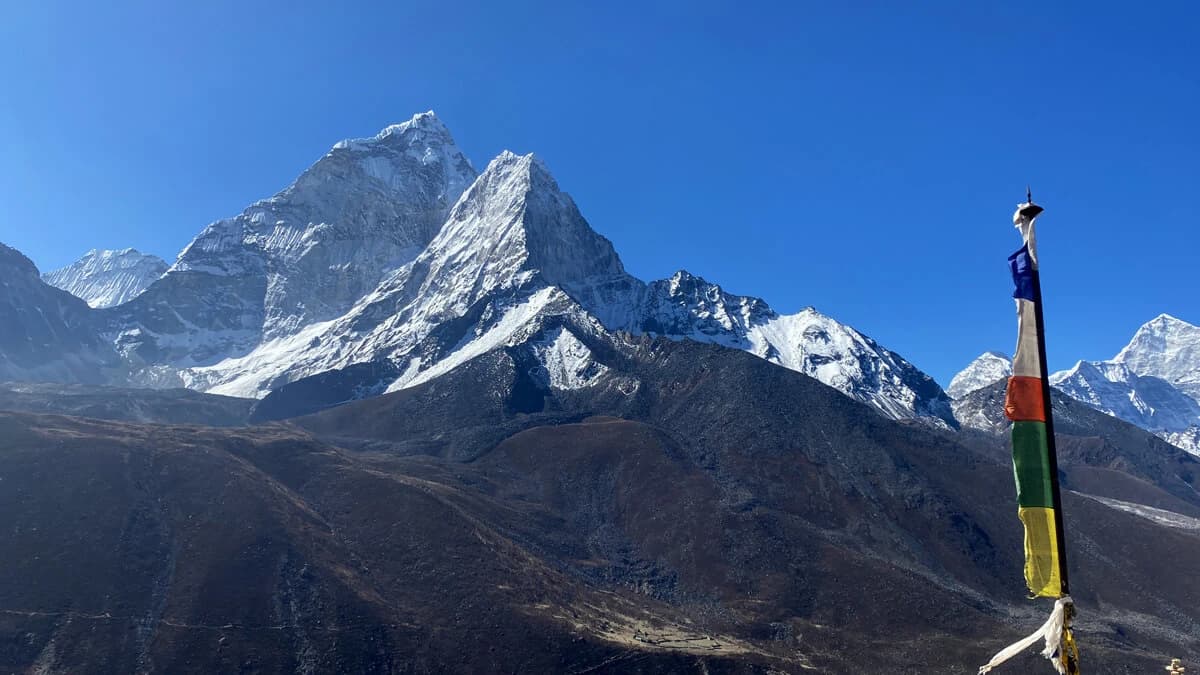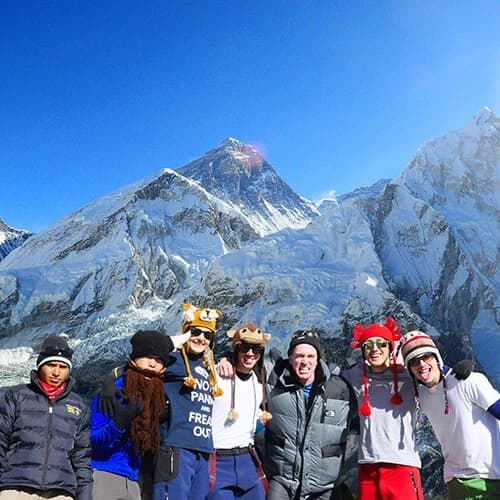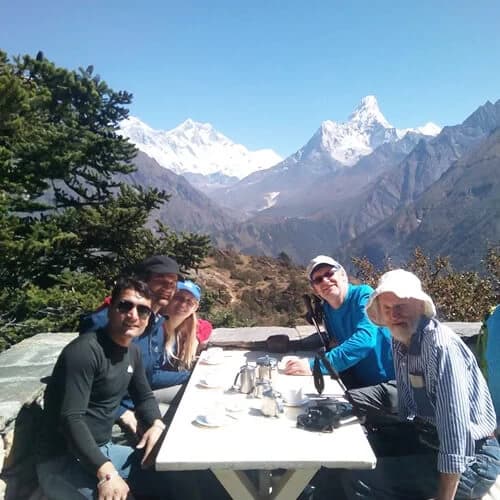For many travelers, the Everest Base Camp Trek is the experience of a lifetime. As with other expeditions in high-altitude regions, food is crucial in nourishing the body and learning the local culture. On the EBC trek, travelers will have a variety of foods available at the teahouses and lodges. This particular expedition is a remarkable journey in the Himalayas of Nepal, attracting thousands of trekkers and adventurers worldwide. As you chase the towering Mount Everest base camp, you will enjoy the distinct cuisine and beverages of the Khumbu/Everest region. The following blog will provide you with an overview of what you should expect regarding the foods and drinks in the Everest Base Camp Trek. The information we have provided will surely enhance your journey and improve your experience along the trail.
Food and Drinks in the Everest Base Camp Trek
Food on the Everest Base Camp Trek
While trekking in high-altitude regions, your body needs a balanced and nutritious diet to replenish itself with energy. Along the trail, you will stay at teahouses and lodges, providing you with various dining options. The food options in these charming accommodation establishments range from local traditional to Western dishes. You must remember that the menu items might be limited and more expensive as you ascend higher in the trek.
Local Cuisine
During the Everest Base Camp Trek in Nepal, travelers must try authentic Nepali cuisine, such as dal bhat tarkari, which includes rice, lentil soup, vegetables, and meat. We also recommend you try other dishes such as dado, roti tarkari, and gundruk.
Western Taste
Most Khumbu/Everest region tea houses serve Western cuisines such as noodles, pasta, pizza, pancakes, burgers, and macaroni. While these dishes may vary in quality compared to the West, they offer familiar flavors for those who seek comfort.
Snacks
During the EBC trek, you will walk for 5-6 hours daily, so you must boost your energy. We suggest you pack protein bars, granola bars, jerky, nuts, and dry fruits. You can portion the snacks accordingly to sustain the amount of proteins you intake along the trek.
Breakfast Options on the EBC Trek Route
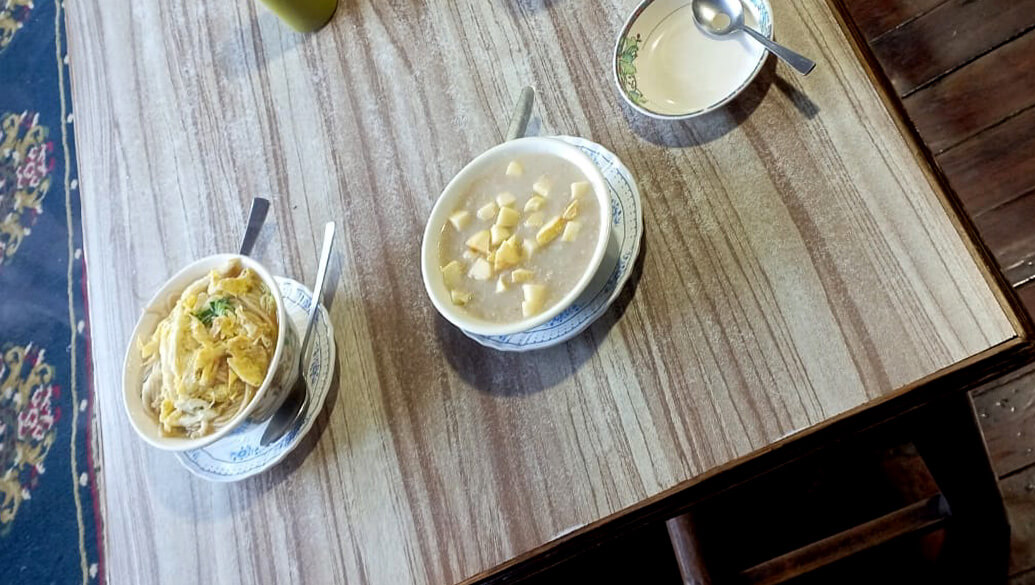
Breakfast is an essential meal for trekkers, as it offers the energy and nutrients to start the day of hiking. A proper breakfast will maintain your energy levels, enhance your endurance, and fuel you throughout the journey. Usually, most teahouses and lodges provide breakfast around 7 a.m. to 8 a.m. Here are some popular options for breakfast on the EBC trek.
- Oat porridge/Muesli
- Rice pudding
- Plain Toasts
- Toast bread with honey
- Plain Omelette
- Scrambled egg
- Cheese Omelette
- Pasta
- Tibetan pancakes
- Chapati with peanut butter
- Tea/Milk tea/Black tea/Lemon tea/Ginger tea
- Milk coffee/Black coffee
Lunch and dinner on the Everest Base Camp Route?
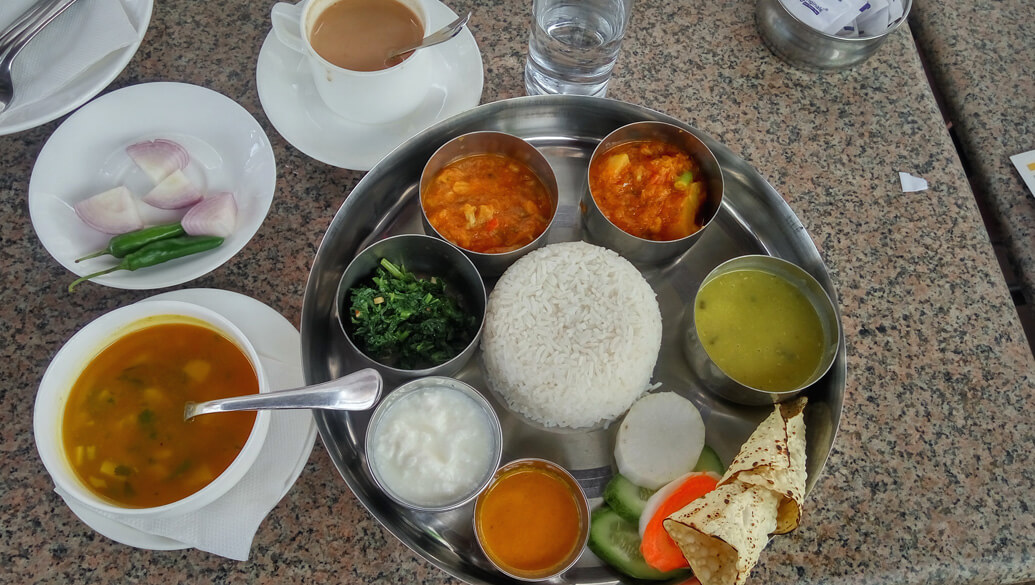
The teahouses along the trail offer various options for lunch and dinner. In the trek's daily routine, lunch is served in the afternoon from 12:00 p.m. to 1:00 p.m. On the other hand, dinner is served from 7:00 p.m. to 8:00 p.m. We have listed the dishes available in the trek, which you can choose for lunch or dinner.
- Non-veg dal bhat
- Veg dal bhat
- Egg/Mix/Buff/Chicken fried rice
- Egg/Buff/Chicken/Veg Chow Mein
- Chicken/Buff/Egg Thukpa
- Sherpa Stew
- Buff/Chicken/Veg momo
- Pasta with egg
- Pasta with cheese and tomato sauce
- Macaroni
- Spaghetti with cheese
- Spaghetti with tuna fish
- Pizza
- Grilled egg/chicken/cheese/tuna sandwich
How much does food cost on the Everest Base Camp trek?
During the EBC trek, the food costs range from $20 to $30 per day, approximately $5 to $10 per meal. However, the cost depends on the food items you choose. The price remains consistent in most cases, but it will significantly increase as you ascend higher along the trek. The main reason behind this is the need for more sophisticated transportation access, leading to goods being transported by yaks and porters. Overall, the food costs in the EBC trek are lower than those of other trekking routes, such as the Manaslu Circuit trek and Annapurna Base Camp Trek.
Freshness and Hygiene: How Does it Work?
Suffering from food poisoning is the last thing a trekker could hope for while traveling to the Everest Base Camp. It could lead to stomach issues and severe health conditions. However, it would help if you did not worry; the teahouses along the trail ensure fresh and hygienic food.
How Freshness Is Maintained
When dining at the top of the world, the freshness of the food is maintained to cater to the needs and wants of the travelers.
- Local Produce: The teahouses use locally grown vegetables and herbs, ensuring the food's ingredients are healthy and nutritious.
- Limited Meat: The food items on the menu are limited in the higher elevations of the trek due to challenges regarding safe storage procedures.
- Daily Preparation: The teahouse meals are prepared daily, and the stocks are checked to see if they have gone stale.
Hygienic Practices in Food Preparation
- Apart from providing healthy meals, ensuring food safety is also a high priority for the teahouses in the Khumbu region.
- Boiled Water: The water is boiled to kill harmful bacteria before serving you.
- Clean Utensils: Utensils used to deliver food are cleaned and boiled to ensure they are germ-free.
- Trained Staff: The staff are trained in food hygiene, including the importance of using clean utensils and washing hands.
- Food Storage: Ingredients used to prepare meals are stored in sealed containers to avoid contamination from germs and pests.
Food For Altitude Sickness
As food items during the trek determine your health and well-being, choosing the proper meals will help you overcome illness, including altitude sickness. To avoid it, you must consume foods high in carbohydrates and proteins. Meals rich in carbohydrates need less oxygen for metabolism and reduce fatigue. This is why most trekkers consume dry fruits, nuts, sports drinks, and energy bars. As travelers can get dehydrated quickly at higher altitudes, staying hydrated is also a priority. We suggest you drink at least 2 liters of water daily and include soup, tea, and juices in your diet. Beetroot, garlic soup, or any nitrate-rich food will help you acclimate and keep your body warm and comfortable.
Balanced Diets during the EBC Trek
Maintaining a balanced diet will ensure your body has nutrients and protein. It also fuels your body for the long hike and recovers your muscles at the end of the day. Here are some food items which you must include in your daily diet.
- Carbohydrate-rich foods for sustained energy
- Veg pasta, Fried rice, Noodles, Oat porridge, Chapati, Rice.
- Protein-packed foods for muscle recovery
- Lentils, Veg-momo, Protein bars, Nuts, Tofu.
- Healthy fats for nourishment and long-lasting fuel
- Coconut, Avocado, Nuts and seeds, Olive oil.
- Foods that aid acclimatization
- Ginger tea, Garlic soup, Herbal tea, Foods rich in iron and vitamin C, and Hydrating fruits.
Sherpa Foods on the Everest Base Camp Trek
The EBC trek allows you to explore and immerse yourself in the traditional Sherpa cuisine. Here are some interesting Sherpa foods that you must try during the expedition.
- Tsampa: The traditional Sherpa dish is made from roasted barley flour with butter tea.
- Tingmo is a soft steamed bread from wheat flour served as a side dish with curries and stews.
- Rildok: Rildok is a Sherpa stew made with mashed potatoes, garlic, onion, chilies, and tomatoes.
- Riki Kur: A delicious potato pancake consumed as a carbohydrate source.
- Kur: It is a form of Tibetan bread made from flour dough and is often consumed as a side dish or a snack.
- Shyaphale: The dish resembles a spring roll filled with meat and vegetables. It is deep-fried, which gives it a crispy texture.
- Butter tea: A traditional Sherpa beverage, butter tea is made from yak butter, black tea, and salt.
- Yak cheese: Yak cheese is a local specialty of the Khumbu/Everest region. It is a nutritious, protein-rich snack that comes in various forms.
Special Dietary Requirements
The lodges and teahouses along the trail cater to the needs of vegans and vegetarians alike. Most regional establishments do not offer unique dietary options, so people with special requirements can also enjoy the trek. Vegans can choose from oat porridge, chapati, muesli, and mashed potatoes for breakfast. You can have pasta, macaroni, dal, bhat, tarkari, thukpa, and chowmein for lunch and dinner. These meals are not only filling but healthy as well and are a delight to your taste buds. Besides, inform the guide or the trek leader of any intolerances or food allergies. This will ensure the teahouse prepares your meal according to your needs and preferences. Some accommodations even serve dairy-free and gluten-free alternatives, but you must inform them beforehand. This way, the teahouses can accommodate your needs, making the trek experience more enjoyable.
Some Most Popular Treks
- Everest Base Camp Trek - 14 Days
- 12 Days Everest Base Camp Trek
- Everest Base Camp Luxury - 14 Days
- Everest Cho La Pass - 17 Days
- Everest High Pass 16 - Days
- Annapurna Base Camp - 13 Days
- Ghorepani Poon Hill - 7 Days
- Annapurna Circuit - 17 Days
- 12 Days Annapurna Circuit Trek
- Manaslu Circuit - 14 Days
- Manaslu Trek 12 Days
- Everest Base Camp with Island Peak - 16 Days
- Everest Luxury Trek with Helicopter Return
- Langtang Valley - 10 Days

